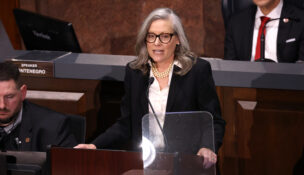Abortion measure to stay on ballot, court rules
Kiera Riley Arizona Capitol Times//August 20, 2024//
Abortion measure to stay on ballot, court rules
Kiera Riley Arizona Capitol Times//August 20, 2024//
The Arizona Abortion Access Act will stay on the 2024 general election ballot after the Arizona Supreme Court rejected arguments from Arizona Right to Life that the measure’s 200-word description is misleading.
In a unanimous decision affirming a prior ruling from the superior court, justices found the abortion act’s description accurately described the measure and concluded a reasonable person would be able to discern its key provisions.
“The Description explains each of these provisions and the tests that would apply to restrictions upon that right. Nothing in the Description ‘either communicates objectively false or misleading information or obscures the principal provisions’ basic thrust,’” Chief Justice Ann Timmer wrote.
Arizona for Abortion Access celebrated the win and noted their plans to continue to work to shore up votes for the measure come November.
Jill Norgaard, spokesperson for Arizona Right to Life, said in a statement, “We look forward to working with our pro life partners across the state to call for the question – Do you want the Arizona Constitution to be amended to include abortion up to birth? Yes or no?”
The Arizona Abortion Access Act, or Prop. 139, creates a constitutional right to an abortion and prohibits the state from limiting access to abortion before fetal viability unless justified by a compelling government interest.
Arizona Right to LIfe, an anti-abortion nonprofit, claimed key omissions from the summary misled voters who signed off on the petition, warranting its removal from the 2024 ballot.
In both the superior court and on appeal, attorneys for Arizona Right to Life argued the description failed to address “critical questions” on who determines fetal viability outside of the womb, noting the description failed to include “treating” before health care provider and had medical decisions hinging on “good faith judgment’ rather than “an objectively verifiable medical standard.”
The group further claimed the descriptions’ failure to make it clear that the act would walk back existing abortion laws and prevent future abortion regulation culminated in “confusion” for those who signed off on the petition.
“The Ballot Measure Proponents wanted an unfettered right to an abortion enshrined in the Arizona Constitution but did not want to tell would-be signers that because they knew that would be a turn-off. And the Ballot Measure Proponents continue to want to have their cake and eat it too, eschewing politically damaging admissions of how broad the Amendment is,” Arizona Right to Life attorney Jen Wright wrote in briefing to the Arizona Supreme Court. “It is the Ballot Measure Proponent’s right to create a broad right to abortion, but they must describe it accurately.”
Maricopa County Superior Court Judge Melissa Julian found “the description accurately and fully communicated the initiative’s key provisions” and declined to order its removal from the 2024 ballot.
The Arizona Supreme Court unanimously affirmed the lower court’s ruling and again rejected Arizona Right to Life’s argument that the description was inaccurate.
“The Description is not required to explain the Initiative’s impact on existing abortion laws or regulations,” Timmer wrote. “Moreover, a reasonable person would necessarily understand that existing laws that fail the prescribed tests would be invalid rather than continue in effect.”
She continued, “Similarly, a reasonable person would assume that the ‘health care provider’ tasked with determining fetal viability would ordinarily be the pregnant woman’s own treating physician, who is, by virtue of such person’s profession, guided by ethical codes and presumably acts in good faith to preserve her health.”
Justice Clint Bolick recused himself from the matter as he is the spouse of Sen. Shawnna Bolick, R-Phoenix. Court spokesperson Alberto Rodriguez, said in a statement that Bolick worked with the Court’s ethics counsel to develop guidelines and would recuse “in any challenge to the constitutionality of a law in which he is aware that his wife was a prime sponsor or prominent identified as a supporter or opponent. Otherwise, he will not.”
Timmer designated retired Justice John Pelander to sit on the case in Bolick’s place.
Access Arizona for Abortion Access filed to see Justice William Montgomery recuse himself, given past anti-abortion comments, but he declined to do so.
In prefacing the ruling, Timmer noted the decision “does not rest on the justices’ morals or public policy views regarding abortion,’” citing from the ruling keeping the 1864 abortion ban in place.
“Rather, our task is to apply the law governing initiative descriptions fairly and impartially in the context of the people’s exercise of the legislative power through initiative,” Timmer wrote.
The court order directed the Secretary of State to prepare to print the measure on the 2024 ballot.














































